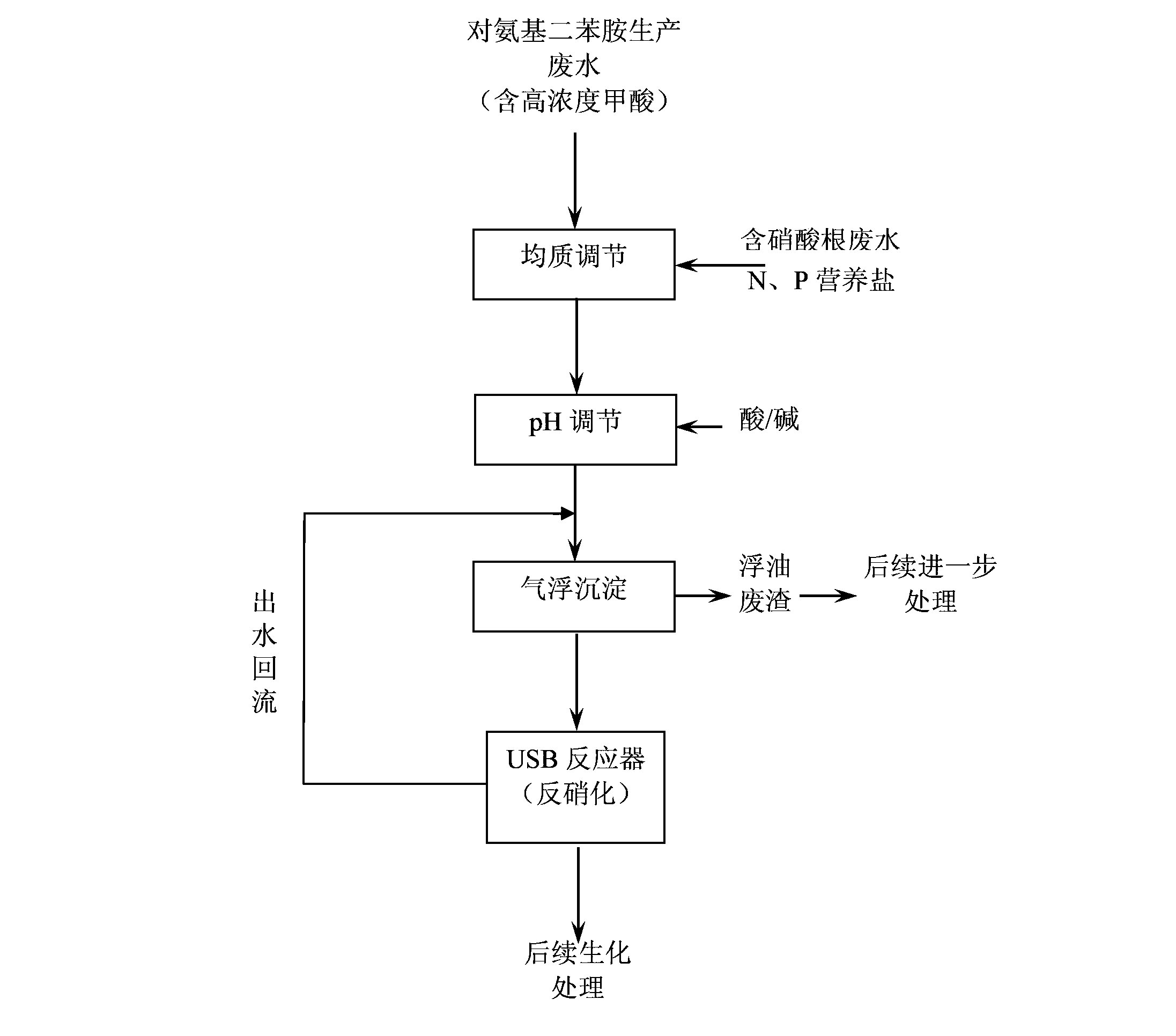Method for accumulating nitrite nitrogen by performing short-cut denitrification on p-aminodiphenyl amine production wastewater
A technology of p-aminodiphenylamine and short-range denitrification, applied in chemical instruments and methods, water/sewage multi-stage treatment, water/sludge/sewage treatment, etc., can solve the problem of reducing the total amount of aminodiphenylamine pollutants, Achieve the effects of solving emission and governance problems, reducing pollution, reducing TOC and formic acid content
- Summary
- Abstract
- Description
- Claims
- Application Information
AI Technical Summary
Problems solved by technology
Method used
Image
Examples
Embodiment 1
[0036] The flow rate of p-aminodiphenylamine production wastewater in a chemical plant is 100 t / d, and the pollutant indicators before entering the process are: wastewater TOC is 30320 mg / L, formic acid concentration is 117004 mg / L.
[0037] In the homogeneous adjustment tank, the p-aminodiphenylamine wastewater is mixed with the catalyst industrial wastewater containing nitrate, and a small amount of dilution water and the reflux water of the USB reactor are added to dilute the p-aminodiphenylamine wastewater, and the TOC in the effluent of the homogeneous adjustment tank 620.0 mg / L, formic acid 2378.1 mg / L, nitrate 2288.1 mg / L, the C / N ratio in the wastewater was maintained at about 1.2, and 90 mg / L urea and 4 mg / L potassium dihydrogen phosphate were added to it (in PO 4 3- count).
[0038] In the pH adjustment tank, use dilute HCl and the reflux water from the reactor to adjust the pH of the wastewater to 8.6. Then the wastewater flows into the air flotation tank by itse...
Embodiment 2
[0041] The flow rate of p-aminodiphenylamine production wastewater in a chemical plant is 110 t / d, and the pollutant indicators before entering the process are: influent TOC is 41700 mg / L, formic acid concentration is 150023 mg / L.
[0042] In the homogeneous adjustment tank, the p-aminodiphenylamine wastewater is mixed with the catalyst industrial wastewater containing nitrate, and a small amount of dilution water and the reflux water of the USB reactor are added to dilute the p-aminodiphenylamine wastewater. The TOC in the effluent of the homogeneous tank is 773.8 mg / L, formic acid is 2643.0 mg / L, nitrate is 2240.0 mg / L, and the C / N ratio in the wastewater is maintained at about 1.5. At the same time, 95 mg / L of urea and 5 mg / L of potassium dihydrogen phosphate ( by PO 4 3- count).
[0043] In the pH adjustment tank, use dilute HCl and the reflux water from the reactor to adjust the pH of the wastewater to 7.5. Then the wastewater flows into the air flotation tank by itsel...
Embodiment 3
[0046] The flow rate of p-aminodiphenylamine production wastewater in a chemical plant is 120 t / d, and the pollutant indicators before entering the process are: influent TOC is 59940 mg / L, formic acid concentration is 247000 mg / L.
[0047] In the homogeneous adjustment tank, p-aminodiphenylamine wastewater is mixed with nitrate-containing magnesium nitrate water, and a small amount of dilution water and USB reactor part of the reflux water are added to dilute the p-aminodiphenylamine wastewater, and the effluent of the homogeneous tank TOC is 1198.8 mg / L, formic acid is 4940.0 mg / L, and nitrate is 2654.5 mg / L. The C / N ratio in the wastewater is maintained at about 2.0. At the same time, 94 mg / L of urea and 3 mg / L of potassium dihydrogen phosphate are added to it. L (in PO 4 3- count).
[0048] In the pH adjustment tank, use dilute HCl and the effluent from the reactor to adjust the pH of the wastewater to 9.5. Then the wastewater flows into the air flotation tank by itself ...
PUM
 Login to View More
Login to View More Abstract
Description
Claims
Application Information
 Login to View More
Login to View More - R&D
- Intellectual Property
- Life Sciences
- Materials
- Tech Scout
- Unparalleled Data Quality
- Higher Quality Content
- 60% Fewer Hallucinations
Browse by: Latest US Patents, China's latest patents, Technical Efficacy Thesaurus, Application Domain, Technology Topic, Popular Technical Reports.
© 2025 PatSnap. All rights reserved.Legal|Privacy policy|Modern Slavery Act Transparency Statement|Sitemap|About US| Contact US: help@patsnap.com

